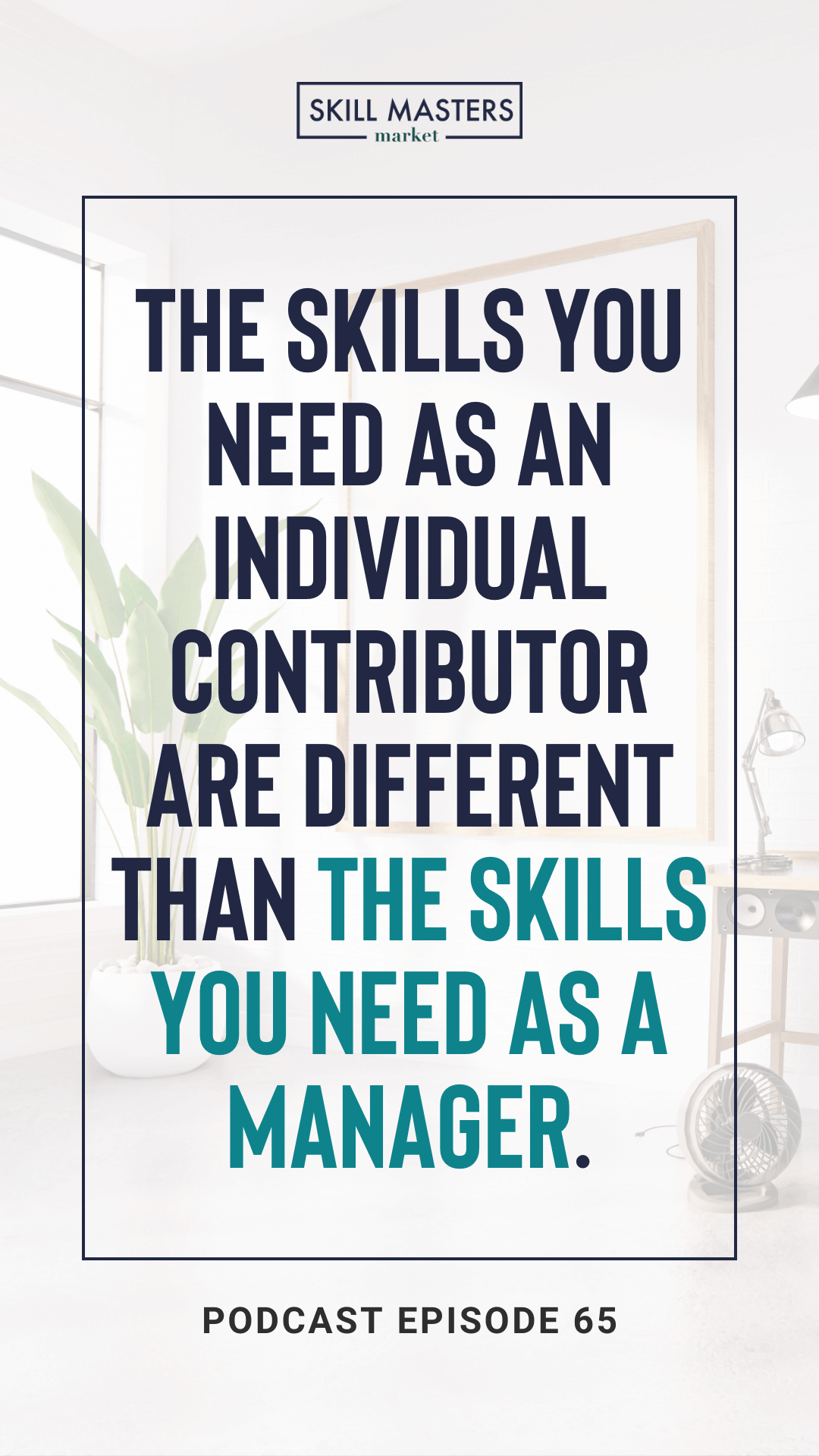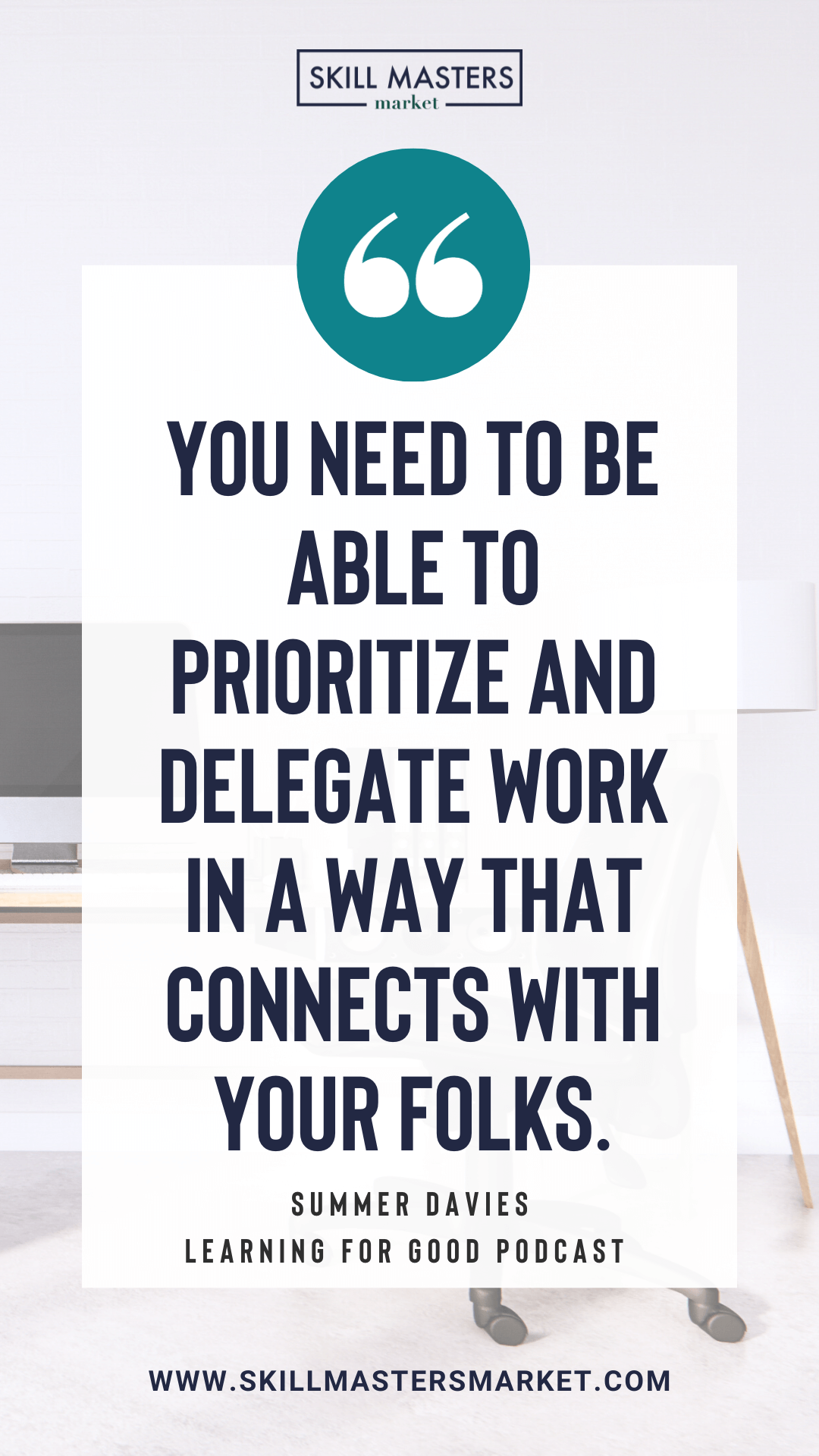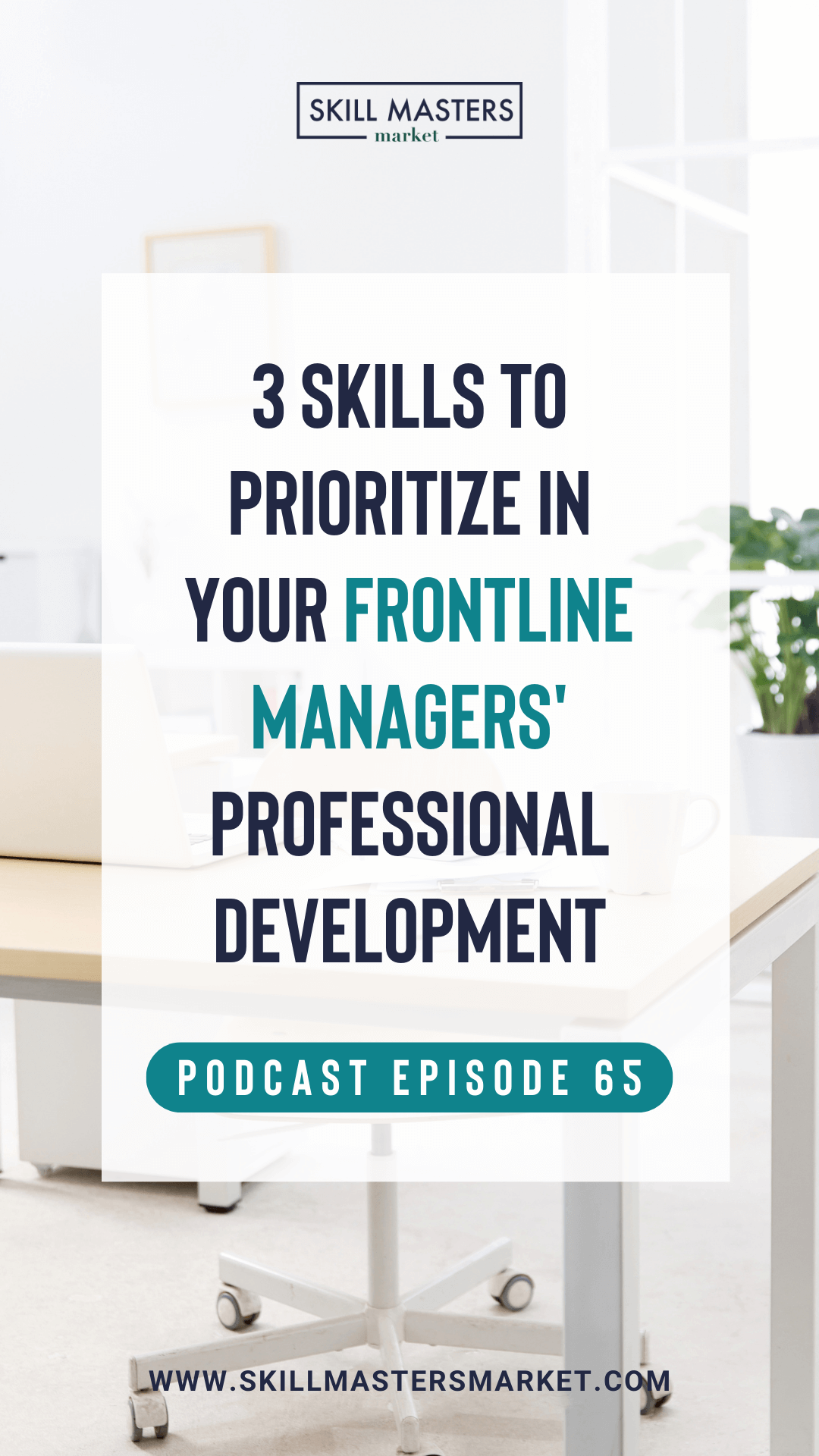3 Skills to Prioritize in Your Frontline Managers' Professional Development
The skills you need as an individual contributor are different than the skills you need as a manager. We hear it time and time again - you promote your very best individual contributor to a supervisory position and they struggle because they aren’t equipped with the skills they need.
That’s why I’m so excited to have Summer Davies, an award-winning leadership development expert with over 15 years of experience, as my guest today. We talk about the 3 basic skills your frontline managers need and how you can develop these skills.
Listen to the episode or scroll down to read the blog post ↓
Key Points:
03:35 Summer’s career journey from equine reproduction to an award-winning leadership development expert
10:51 Why organizations struggle so much with frontline manager positions
03:15 Why frontline managers are so critical to organizations
17:37 The 3 basic skills that all frontline managers should have
22:48 How to develop these critical skills in your frontline managers
Click here to listen on Apple Podcasts. While you're there, subscribe to be the first to know about new episodes!
3 Skills to Prioritize in Your Frontline Managers' Professional Development
We hear it time and time again - you've promoted your very best individual contributor to a supervisory position and they are struggling.
But they didn't have the skills they needed to manage others, despite being so good at their job as an individual contributor. Does that mean promoting them was the wrong decision?
Not necessarily.
However, the skills you need as an individual contributor are different than the skills you need as a manager.
This might be resonating with you. And I know so many nonprofits are thinking about this right now. How can they develop these frontline managers? That's why I was so excited to have Summer Davies on the podcast to talk about developing frontline managers for long-term success.
In this blog post, we’re covering the following:
Learning Strategy: The 3 Basic Skills Frontline Managers Need
Leadership Development: How to Develop Your Managers' Critical Skills
Summer is an award-winning leadership development expert with over 15 years of experience. She helps burgeoning leaders develop the mindset and tactical skills to lead with impact, competence, empowerment, and a genuine love for what they do.
1) Frontline Managers: Barriers to Employee Development
Summer explained the two main reasons why organizations struggle to support frontline managers.
1. Organizations Over Resource at the Top
Summer points out that organizations funnel a lot of their leadership development funding or efforts towards the more senior people in the organization.
“I think that is done out of really good intention, thinking these people who sit in the top seats have the biggest leadership umbrella. And so if we invest in them, that will trickle down.” - Summer Davies
While there is some truth in this theory, Summer explains that it is not a long-term solution.
“It's a little bit like looking at a tree and saying, well if I just trim and take care of the top of the tree, everything will be fine. It will be fine for a little while. But if you neglect everything underneath it, you will eventually end up with a dead tree. And that's what many organizations are struggling with.” - Summer Davies
Summer continues by saying that because top leaders are so visible, that is often where development dollars go.
“We think that those top leaders have the biggest influence on the culture of our organizations, or the productivity of organizations when yet every piece of research tells us that that is not true. The people who have the most influence over culture and productivity are frontline leaders.” - Summer Davies
2. Organizations are Busy
“Building, selecting, and implementing leadership development takes time. And many organizations just don't have that time. So they would absolutely love to do it. It's just hard to be able to do it when you've got 10 million things going on.” - Summer Davies
So what Summer is talking about would require a bit of a culture change, as well as some behavior change for individuals within the organization to really shift from this over resourcing at the top of organizations to focusing on frontline managers, and also making time for it, because there are so many competing priorities.
2) Employee Development: Your Frontline Managers are Critical
I asked Summer why frontline managers are so critical to organizations, and in her answer, she references two Gallup books.
First, Break All the Rules: What the World's Greatest Managers Do Differently by Gallup Press
It's the Manager: Gallup finds the quality of managers and team leaders is the single biggest factor in your organization's long-term success by Jim Clifton and Jim Harter
Summer summarizes that data and tells us that frontline managers, “have the greatest degree to influence things like productivity, turnover, safety incidences, quality, innovation, all those types of things that most organizations get really excited about. The frontline manager is the one who drives that essentially.”
Summer explains that if you think about that, you know that's true because they're the ones who are creating the everyday environment that people work in.
“If I'm working with new managers, often what I like to tell them is whether or not you appreciate this, you are dinner table conversation.” - Summer Davies
What this means, Summer explains, is that the people on their team are going to talk about them. The first question that comes up at the dinner table is often, “How was your day?”
“What you start talking about is the projects you got to work on, how you got on with the people that you work with, how you got feedback or didn't get feedback, how you were recognized or not recognized. All of those things ladder up to that manager. So if you're a frontline person, you are having that conversation about your manager. If I'm talking to managers, I remind them that they are impacting how those people feel about the work that they do because they are the one who's in charge of setting priorities, giving feedback, and delegating work. All these things that make such a huge difference.” - Summer Davies
Summer explains that if we start thinking about that in the context of the culture you create for your organization, it’s obvious that the ROI of investing in those managers is huge.
3) Learning Strategy: The 3 Basic Skills Frontline Managers Need
Summer has had the privilege to study 1000s of managers in countries all across the globe in multiple different industries.
“The reality is that those core skills don't shift. There may be some ancillary cultural behaviors that you need, for sure. But these core skills, based on the data, are pretty consistent. And I'm not the only one who's done that research. There are lots of people and organizations out there who can confirm that's the case.” - Summer Davies
This reminds me of the way I think about competency models. When I'm working with competency models for organizations, there are absolutely unique skills that your organization needs. But there are also common skills that come up time and time again in any organization.
To learn more about competency models, check out these past episodes:
Episode 51: Using Your Competency Model to Develop a Comprehensive Training Program And Boost Workforce Development
Episode 39: Ask These Two Questions to Identify Your Nonprofit's Core Competencies
Episode 20: How to Determine Which Competencies Are Right for You
Episode 19: One Nonprofit's Honest Opinion after 6 Months with a Competency Model
Summer explained that there are three basic skills that all frontline managers should have.
1. Leadership Mindset
Summer explains that the first skill is more of a mindset. Frontline managers need to be able to articulate why they want to lead people.
“Why do they want to lead people? How does that connect to their purpose, particularly for nonprofits? Hopefully, that purpose connects to whatever cause it is that your nonprofit is serving. And so what is it about leading a team that enables you to do something for this cause that is different than what you could do as an individual? And if they can answer that really well, that gets the manager in the right mindset to be able to understand how they can shift from the impact they make as an individual to the impact they can enable a group of individuals to make.” - Summer Davies
Summer explains that this is a critical difference and that distinction is often missed when somebody is promoted.
2. Effectively Prioritizing and Delegating Work
Summer explains that frontline leaders need to be able to understand how to prioritize work for others, which is different than prioritizing work for yourself.
“Connected to that one is being able to effectively delegate. You need to be able to prioritize and delegate work in a way that connects with your folks. Leaders need to be able to flex their leadership style. Most of the research tells us that about half of people always use the same style and approach no matter what they're presented with. An effective leader needs to be able to shift that style pretty fluidly.” - Summer Davis
3. Giving Effective, Actionable Feedback
This last skill, Summer says is the most critical.
“You have to be able to give effective, actionable feedback. And so many folks get lost in the way that they give feedback and in concerns and anxiety around giving feedback. And then they end up not being able to give actionable feedback.” - Summer Davies
4) Leadership Development: How to Develop Your Managers' Critical Skills
Summer points out that there are a lot of ways that you can develop these skills that are inexpensive and simple because these are really basic skills. It does, however, take a little bit of time.
1. Mentorship Programs
“This person has effectively demonstrated the ability to understand organizational priorities and then delegate work on their team in connection with that. Set up a mentorship program for that person to be able to talk with others about how they do that. Or if you've got somebody who consistently delivers really high-quality feedback, get that person in a town hall and have them share a little bit about what they do.” - Summer Davies
2. Bookclubs
“Get a book, maybe folks can share a copy. If you can afford to buy everybody a copy, even better. And then have them discuss the skills and really focus on application with their teams.” - Summer Davies
3. Courses
Summer recommends picking a couple of skills you really want to work on and finding some low-cost courses. Have people take the course and then talk about it together.
“The element that I'm continuing to drop into each one of these is learning through application. Finding ways for them to go and apply it on the job, and then learning with others. So the ability to either work with a mentor or with peers, one for accountability, but secondarily, for additional perspectives.” - Summer Davies
Summer also recommends sending your managers through a frontline leadership program if you have the budget for it. She furthers this by saying that she sees a higher ROI on off-the-shelf programs rather than creating a custom program inside of your organization.
“Unless you are incredibly well-resourced, with a phenomenal design and development team that can build things really fast for you. I haven't seen a lot of ROI for organizations that choose to go and build something really bespoke inside their organization.” - Summer Davies
As someone who creates custom training, I tend to be hesitant of off-the-shelf solutions because they don’t always meet your unique needs. But, for basic skills like this, there is lots of off-the-shelf content available and the custom piece of it really does come in the application process and that social or peer learning process. So that is something custom that you could provide as a wrap-around to off-the-shelf content. It will take less time to develop, it'll have fewer costs associated with it, and you get the best of both worlds. You get that standard content from an off-the-shelf solution and then you're able to pair that with things that are more tailored to your organization.
To hear the full conversation I had with Summer Davies on the Learning for Good Podcast, scroll all the way up and tune into episode 65.
The Nonprofit Learning and Development Collective
Do you wish you could connect with other nonprofit learning and development leaders?
I know what it feels like to want someone to bounce ideas off of and to learn from, someone who really understands you and your work. Imagine if you could have a simple way to meet people in the field, ask questions, and share information.
That's why I created the Nonprofit Learning and Development Collective – so nonprofit L&D, talent management, and DEI leaders can connect with each other quickly and easily in a virtual space.
When you join this community, you will walk away with a new, diverse, and powerful network – and a sounding board for your staff development needs.
So if you're ready to exchange ideas and collaborate with your peers, come join the Nonprofit L&D Collective.




